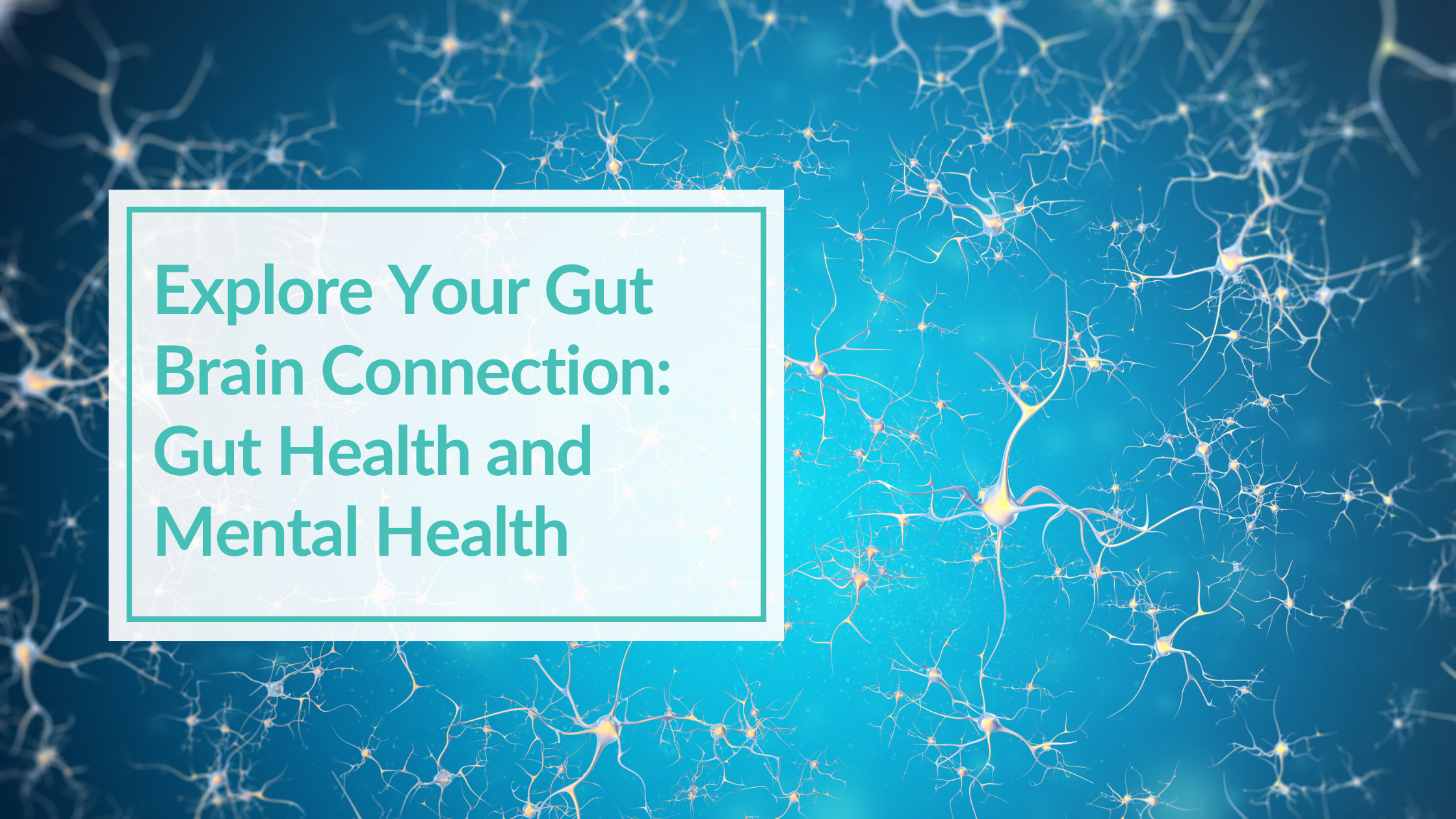
The gut-brain connection – you might think it’s old news in the holistic health world.
It’s not. The gut-brain connection is a topic that keeps scientists, practitioners, and anyone on their wellness journey glued to their seats. It’s not a passing trend, and with tools like bioresonance testing in their arsenal, holistic health pros are shedding even more light on this connection.
If we discuss them as body systems, we would link the Nervous System and Digestive System via the Vagus Nerve. This is the main nerve of your Parasympathetic Nervous System, which influences your digestion, saliva and mucous, immune system, and heart rate.
When this part of the nervous system is activated, we know we are in a state to digest our food properly.
A lot of what you feel emotionally is deeply entwined with what’s going on in both of these systems. Ever had butterflies in your stomach? That’s the gut-brain link at work. This relationship goes two ways—just as our brain can send butterflies to our gut, the health of our gut can affect our emotional state.
So, how do these two powerhouses communicate? Through a complex network of hormonal, neural, and immune pathways.
An imbalance in this connection can lead to a variety of health issues, from simple digestive problems to potential mental health conditions like anxiety.
The Science Behind the Gut-Brain Connection
Scientists have known for years that the gut-brain link is responsible for bidirectional signals communicating with each system.
The Parasympathetic Nervous System is only one part of your Autonomic Nervous System, or ANS. There are 3 branches of your ANS:
- The Sympathetic Nervous System
- The Parasympathetic Nervous System
- The Enteric Nervous System
When we refer to the Gut-Brain link, we are talking about how the Vagus nerve activates and regulates something called the enteric nervous system. This part of your Nervous System is in your digestive tract.
This “second brain,” as it’s sometimes called, consists of sheaths of neurons embedded in the walls of the long tube of our gut. The gut’s brain, or enteric nervous system, comprises two thin layers of more than 100 million nerve cells lining the gastrointestinal tract from the esophagus to the rectum.
This enteric nervous system can function independently from the brain. This is why the gut is sometimes called the “second brain.”
This second brain can control digestion and other functions without any input from the brain. However, the brain still plays a critical role in certain aspects of gut function, such as the perception of hunger and fullness.
If you are under emotional stress, the brain will negatively influence the Digestive System. Stress can change the gut flora, the transit time of food and waste in your digestive tract. That stress response is a reaction to stress and it involves the HPA axis or the hypothalamic-pituitary-adrenal axis. This stress response activates cortisol, which does have an effect on the brain. The brain has an effect on the gut, specifically on immune cells, epithelial cells, enteric neurons, and smooth muscle cells (1).
Stress can also change your gut mucosa, which helps with immunity and plays a role in food sensitivities. We point a lot of fingers at food for causing our digestive issues. However, are your sensitivities from the food, or is it really rooted in your gut mucosa?
How the Gut Influences the Brain
The gut influences the brain through various mechanisms. One of the most important is the gut microbiome, the community of beneficial bacteria that live in the digestive tract. These bacteria produce chemicals that can influence the brain. For example, certain species of bacteria can produce neurotransmitters, chemicals that the brain uses for communication.
The gut microbiome also influences the brain through its role in the Immune System. Gut bacteria help regulate the Immune System and can influence the brain through this role. For example, if the gut microbiome is out of balance, it can lead to an overactive immune system, which can, in turn, lead to inflammation in the brain.
In addition, the gut can also influence the brain through its role in digestion. Digestive processes involve breaking down food, absorbing nutrients, and eliminating waste. All of these processes can impact the brain. For example, certain nutrients are needed for brain health, and if the gut is not properly absorbing these nutrients, the brain will lack this support.
Your Nervous System needs to be in a certain state of relaxation, the rest and digest state, to digest your food properly. When we eat in a state of stress, with our sympathetic (fight-or-flight) nervous system activated, blood and circulation are not supplied to the digestive system. Instead, they are supplied to the brain and muscles.
The Impact of Gut Health on Mental Health
The gut-brain connection has significant implications for mental health. Changes in the gut microbiome have been linked to a range of mental health conditions, including depression, anxiety, and even neurodegenerative diseases like Parkinson’s and Alzheimer’s. Some studies suggest that the gut microbiome could influence mental health by producing substances that affect brain function.
For instance, many gut bacteria produce neurotransmitters, such as serotonin and dopamine, which are crucial in mood regulation.
Did you know 90% of your serotonin is made in your gut?
A deficiency in these neurotransmitters, especially serotonin, is associated with depression and anxiety. This suggests that an imbalance in the gut microbiome could potentially lead to a deficiency in these important neurotransmitters, contributing to mental health issues.
Additionally, an unhealthy gut can trigger an inflammatory response, which can affect the brain and lead to mental health issues, along with other health problems. Chronic inflammation has been linked to a higher risk of mood disorders like depression. Therefore, maintaining a healthy gut can be critical to maintaining good mental health.
The Role of Diet in the Gut-Brain Connection
Diet plays a crucial role in the gut-brain connection as it directly influences the composition of the gut microbiome. A diet rich in fruits, vegetables, whole grains, and fermented foods can promote the growth of beneficial gut bacteria and a healthy gut-brain connection.
On the contrary, a diet high in processed foods, sugar, and unhealthy fats can disrupt the balance of the gut microbiome, potentially leading to gut-brain issues. Such a diet can reduce the diversity of the gut microbiome and promote the growth of harmful bacteria, which can negatively affect the gut-brain connection.
A healthy brain requires certain nutrients. Omega-3 fatty acids in fatty fish, walnuts, and flaxseeds are essential for brain health and function. If the gut is not properly absorbing these nutrients from an unhealthy or leaky gut, it can lead to brain health issues.
Probiotics and the Gut-Brain Connection
Probiotics, beneficial bacteria that can be consumed through certain foods or supplements, are another important aspect of the gut-brain connection. These bacteria can help restore balance to the gut microbiome, which can, in turn, positively affect the gut-brain connection.
Some studies have shown that probiotics have a positive effect on mental health. They can produce neurotransmitters, influence the immune system, and even interact directly with the brain through the gut-brain axis. They also crowd out pathogenic bacteria and fungi.
Probiotics may help improve mental health by restoring balance to the gut microbiome. However, more research is needed to fully understand the potential benefits of probiotics for mental health.
How to Improve Your Gut-Brain Connection
Improving your gut-brain connection starts with maintaining a healthy gut. This can be achieved through diet, exercise, stress management, and potentially the use of probiotics.
Eating a diet rich in fruits, vegetables, whole grains, and fermented foods can help promote a healthy gut microbiome. Regular exercise has also been shown to positively affect the gut microbiome and help manage stress, another factor that can impact the gut-brain connection.
Managing stress is another important aspect of maintaining a healthy gut-brain connection. Chronic stress can negatively impact the gut microbiome and cause inflammation, which can, in turn, impact the brain. Therefore, stress management techniques such as meditation, yoga, and deep breathing can be beneficial.
Top Takeaways to Enhance Your Gut-Brain Connection
The gut-brain connection is just one link the Digestive System has to your whole body’s health. There are so many more!
This specific connection suggests that our mental health may be more closely linked to our diet and lifestyle than previously thought. While we always want you to see a licensed mental health practitioner if you suspect you have any mental health issues, we do encourage you to look at your body holistically. The body-mind connection runs very deep!
Even though new research will constantly surface about the gut, it’s clear that maintaining a healthy digestive environment is important for a healthy brain and Nervous System. By eating a healthy diet that is individual to you, managing your emotional stress, exercising, and moving regularly, you can help maintain a healthy gut-brain connection and protect your mental health.
Simple nutrients like probiotics, zinc, and omega-3 fats can support your gut, and our testing helps tailor these to your body’s specific bioenergetic needs.
Supporting both systems, the Digestive System and Nervous System can extend beyond the physical aspects of balanced health.
You may feel calmer, centered, and resilient by supporting the gut-brain connection.
DISCLAIMER: Balanced Health, LLC/CBH Energetics and any parent, subsidiary, affiliated or related entities and companies do not provide medical advice or services. This post and the bioenergetic products and services offered by Balanced Health, LLC/CBH Energetics including, but not limited to, bioenergetic tests, bioenergetic scans, bioenergetic reports and related products and services (collectively the “Bioenergetic Products and Services”) are designed for educational and informational purposes only and are not intended to diagnose, treat, cure, or prevent any disease, condition, complaint, illness or medical condition and are not a substitute for professional services or medical advice. Testing is not used for the purpose of obtaining information for the diagnosis, prevention, or treatment of disease or the assessment of a health condition, or for identification purposes.

